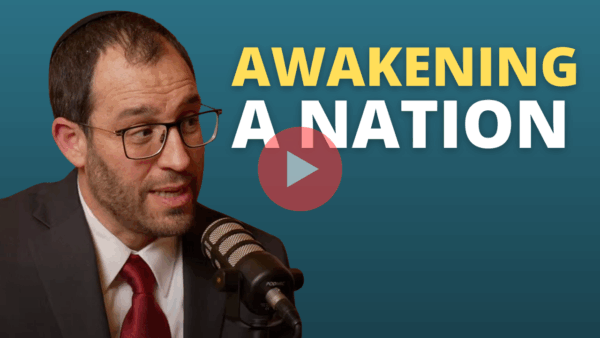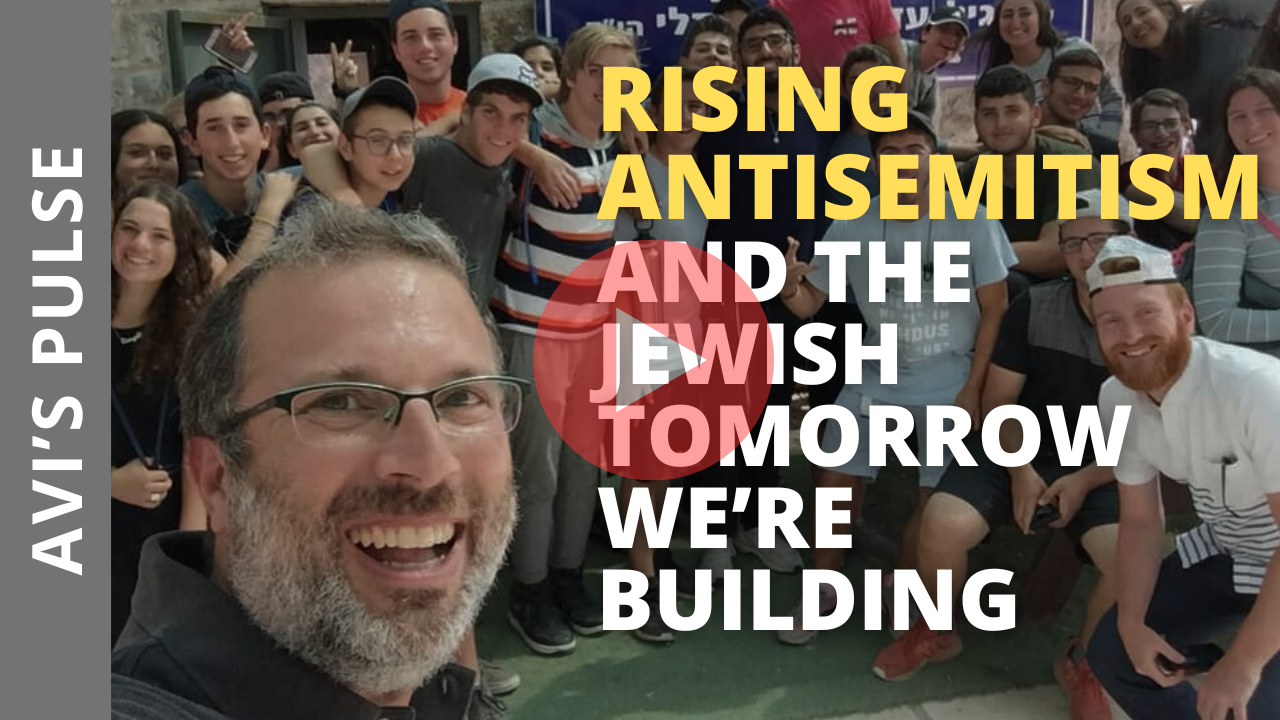If efforts to unite opponents against an antisemitic Democratic Socialist fail, what will be the consequences for Jewish life in New York City or the rest of the country?
The most famous former resident of New York City summed up the state of the mayor’s race succinctly. In the words of President Donald Trump, it’s “not looking too good” for either man trying to stop Zohran Mamdani from being elected mayor on Nov. 4.
It’s this growing realization that—barring an unexpected development—the Democratic Socialist and inveterate opponent of the existence of the State of Israel is going to be sworn in come January as mayor of the world’s largest Jewish city outside of Israel that is setting off something like panic among the city’s Jews.
The seriousness of the situation is illustrated by the fact that the concern about the future of Jews in a Mamdani-led Gotham isn’t confined to the political right. Even leading liberal religious leaders, like Rabbi Elliot Cosgrove of the Conservative movement’s Park Avenue Synagogue and Rabbi Ammiel Hirsch of the Reform movement’s Stephen Wise Free Synagogue, have been sounding the alarm about Mamdani’s willingness to endorse antisemitic tropes and his support for anti-Zionist agitation.
The 34-year-old’s animus for Israel and its supporters isn’t a sidebar to his political rise. It’s a foundational belief for the man who founded a chapter of the antisemitic Students for Justice in Palestine at Bowdoin College in Maine and has continued to be a consistent supporter of their cause. He has shown some willingness to compromise on many of his campaign pledges, which center on a hard-core Socialist approach to government, promising cheaper housing, groceries and free bus rides. But the one point on which he won’t budge is his opposition to a Jewish state and support for incitement against it, including genocidal chants like “From the river to the sea” and “Globalize the intifada.”
So, it’s fair to ask ourselves now, with less than two weeks before Election Day, what the consequences would be for Jewish life in New York City after a Mamdani win. It’s equally important to ponder what it would mean for the rest of American Jewry if his triumph adds even more momentum to the push for the takeover of the Democratic Party by its intersectional left-wing base.

Pressure on Sliwa
That’s the context for the increasingly strident debate about whether or not Republican candidate Curtis Sliwa should pull out of the race to give former New York Gov. Andrew Cuomo, a Democrat who is running as an independent, a one-on-one matchup with Mamdani. It doesn’t mean he will win; the much younger state assemblyman trounced the 67-year-old in their party’s June primary.
The president wasn’t particularly optimistic about such a scenario. In that case, Trump said, “maybe Cuomo would have a little bit of a chance, but not much.”
That’s an accurate assessment of the situation, even after the latest poll published gave those trying to stop Mamdani a smidgeon of hope. The AARP poll results gave Mamdani 43%, Cuomo 29% and Sliwa 19%. But it is also being reported that if Sliwa dropped out, it would give Mamdani a smaller 44.6% to 40.7% lead, a finding that gave further impetus to those pressuring the beret-wearing leader of the Guardian Angels to exit the race.
But that isn’t happening, despite the growing drumbeat of calls for Sliwa to—in the words of a New York Post editorial—“swallow this bitter pill.” Sliwa has reacted angrily to those making such entreaties, including otherwise friendly outlets like the Post, or allies like WABC radio-station owner John Catsimatidis and talk-show host Sid Rosenberg, raging at them for pushing him to throw his backing behind Cuomo, a man whom he and most other New York Republicans opposed during his decade as governor for a multitude of reasons.
Part of it is, as an unsympathetic New York Times article put it, Sliwa is enjoying his time in the spotlight and “not about to give it up.” The Republican Party apparatus in the five boroughs, such as it is in a town that is overwhelmingly Democratic, has no desire to be put in thrall to a Democrat who has long been an enemy. They have spent the past few years bashing him for his authoritarian rule during the COVID-19 pandemic and orders that cost the lives of thousands of seniors. And then there are accusations about sexual harassment and bullying that resulted in him being forced from the governor’s office in the middle of his third term in disgrace.
But if the choice is, as Trump put it, “I would rather have a Democrat than a Communist” as mayor of New York, then many of the city’s citizens and most of its Jews have now reached the point where they feel that all decent people need to do whatever they can to stop Mamdani.
The president didn’t join the chorus of those demanding Sliwa demur to Cuomo mostly because he seems to think it is a lost cause. There’s also the fact that many national Republicans are licking their chops at the prospect of Mamdani and fellow New York Democratic Socialist Rep. Alexandria Ocasio-Cortez (D-N.Y.) becoming the most visible members of their party during the 2026 midterm elections. Mamdani is running against Trump in New York, but Trump and GOP candidates nationwide will be able to point to what happens when you elect radical Democrats. They have come to the entirely reasonable conclusion that empowering Mamdani will help the GOP next year and in 2028, whether or not AOC runs for and/or wins the Democratic presidential nomination.
Still, for New York’s Jews, including the not inconsiderable and growing number who are Republicans, that possibility pales into insignificance compared to what it would mean to them and their families if someone who, despite the disclaimers from the candidate and others on the left, is an open ally of antisemitism in control of their city.
Isolating the Jews
The ability of any mayor of New York City to govern effectively is heavily limited by the control of the state government over many aspects of city life and its budget. The implications, however, of having someone who views Jews and Jewish beliefs as part of a settler-colonialist entity like Israel are far-reaching.
The Mamdani candidacy calls into question a basic premise of American Jewish life dating back to President George Washington’s famous 1790 letter to the Jews of Newport, R.I., when he promised that the new American republic “gives to bigotry no sanction, to persecution no assistance.”
Mamdani’s support for the virulently antisemitic mobs that took over campuses at major New York institutions like Columbia University, New York University, various branches of the City University of New York (CUNY) and smaller-scale but consistent demonstrations at the New School is at the heart of his political identity. He stands for a point of view that delegitimizes and demonizes mainstream Jewish life. For him, only Jews who are willing to deny an essential element of Jewish identity, ethnicity and faith by disavowing Israel and Zionism deserve to be treated as worthy of being allowed into the public square and to be defended as equal citizens.
As Rabbi Cosgrove put it, “Zionism, Israel, Jewish self-determination—these are not political preferences or partisan talking points. They are constituent building blocks and inseparable strands of my Jewish identity. To accept me as a Jew but to ask me to check my concern for the people and State of Israel at the door is a nonsensical proposition and an offensive one, no different than asking me to reject God, Torah, mitzvot or any other pillar of my faith.”
This is a point that both Cuomo and Sliwa failed to make effectively in their debates with him, including the last one held on Oct. 22, even as they rightly blamed him for stoking the fires of hatred that have gotten out of control in the last two years.
Mamdani’s claim that he would protect New Yorkers against antisemitism rings hollow. More to the point, his administration would undoubtedly adopt woke progressivism as the guiding ideology in all of its activities. This worldview treats Jews and the State of Israel as “white oppressors” as a matter of doctrine.
Under those circumstances, how can the Jewish community, its synagogues, community centers and schools, in addition to college students, take for granted that they will be accorded the protection of city government, as well as the police and other agencies? At the very least, it will be a green light to antisemites to step up their agitation and campaigns targeting Jews on college campuses and elsewhere. And it will create a divide within an already fractured city. With Mamdani’s Socialist patent nostrums likely to exacerbate already existing economic problems, his presence in City Hall will set up a scenario in which those disappointed by the likely failure of his giveaway programs will turn their ire on the Jews, rather than the mayor who will be the driving force behind a looming catastrophe. Once unleashed, the problem will spread throughout the country, especially in urban areas governed by other left-wing Democrats.
That’s why so many in the Jewish community are treating this as a crisis. It’s also why more than 700 rabbis and counting from across America have signed a letter sponsored by the Jewish Majority anti-extremist group calling for Americans “to stand up for candidates who reject antisemitic and anti-Zionist rhetoric, and who affirm Israel’s right to exist in peace and security” and for “our interfaith and communal partners to stand with the Jewish community in rejecting this dangerous rhetoric and to affirm the rights of Jews to live securely and with dignity.”
This potentially puts New York’s Jews in a position that is virtually unprecedented in modern American history. And it makes the last-minute effort to head off this disastrous outcome even more crucial.
Is it too late?
It may be too late to create a “fusion” ticket that would unite the majority of New Yorkers in the cause of stopping Mamdani, which should have been the response to his primary victory months ago. Of course, the changing demographics of New York City, coupled with the tilt to the far left of the Democratic Party, might have guaranteed a Mamdani victory no matter what his opponents did.
The responsibility for this problem belongs both to the quality of the mayoral candidates and to those who didn’t turn out to prevent Mamdani from getting the Democratic nomination in the first place. The other candidates are also at fault. That includes incumbent Mayor Eric Adams, who pulled out of his independent bid for re-election last month after he concluded that the rest of the city, like the Democrats whom he abandoned earlier this year, would not stomach a rerun of a mayor dogged by corruption allegations from which he was bailed out by Trump. It’s just as true of Cuomo and Sliwa.
Having nominated an activist gadfly for mayor, the Republican Party is stuck. Sliwa may be right that Cuomo’s failures are disqualifying; nonetheless, whatever his virtues, he is far too marginal a figure to ever command anything more than a sizable protest vote. His unwillingness to put his personal feelings about the campaign aside and work toward a ticket that would provide a single alternative to Mamdani was a mistake. Indeed, Republicans have little in common with Cuomo’s traditional liberal policy positions and record. Still, Sliwa should have come to the same conclusion as Trump about the choices before the city. With time running out before the voting ends (early voting starts on Saturday), there is still some time for him to act and at least lessen Mamdani’s odds of victory.
Mamdani’s vision of the future, both in terms of socialism and antisemitism, is something that ought to scare any sensible American. And it presents a clear and present threat to American Jews, who have already been affected by the surge of Jew-hatred impacting their lives and security post-Oct. 7, 2023. Those who claim to support the Jewish community shouldn’t stand on the sidelines right now; they should do whatever is necessary to ensure Mamdani’s defeat. Their failure to do so is a sign that they don’t understand the nature of the crisis and is nothing less than an unconscionable failure of moral courage.

 Whatsapp
Whatsapp




